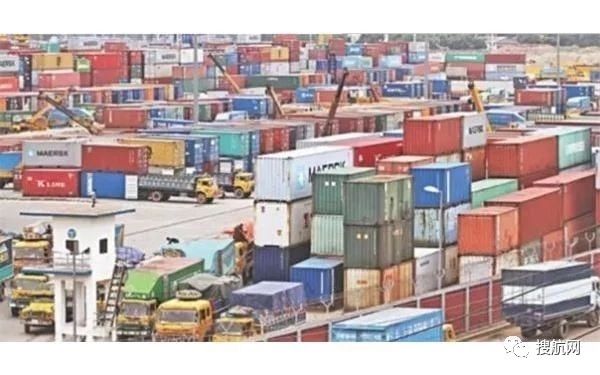Attention 丨 Over 19 countries have entered Ramadan, and the customs port freight forwarding and ware
- Author:MIKEY
- Source:Sunny Worldwide Logistics
- Release Date:2020-04-29
With the passage of time, many countries have ushered in a grand Ramadan. Due to the severe epidemic, most countries pointed out that they should not hold parties to implement curfews to avoid the spread of the epidemic.
In addition, during Ramadan, governments and enterprises in Muslim countries will adjust their working hours, including customs, ports, freight forwarding, warehousing and other agencies and enterprises, and the import and export business may fall into a downturn or even stagnate.
It is especially important to note that due to the impact of the epidemic, imports and exports in some countries will also be affected to a certain extent. It is necessary to arrange the shipment plan reasonably to avoid the arrival of the goods at the port of destination and the incurred additional costs; Can not call the port, affecting the timely delivery of goods.

The countries currently announced to enter Ramadan are:
Egypt, Tunisia, Lebanon, Iraq, Algeria, Libya, Somalia, UAE, Saudi Arabia, Qatar, Bahrain, Jordan, Iran, Israel, Morocco, Syria, Palestine, Turkey, Oman, etc.
Egypt--
Egyptian Prime Minister Madbuli announced on the 23rd that in order to control the development of the new crown epidemic, curfews throughout the country will continue to be imposed during Ramadan this year. The curfew will be implemented from the first day of Ramadan this year, April 24, from 21:00 to 6:00 the next day until the end of Ramadan. Large shopping malls and shopping malls can be open until 17:00 on Friday and Saturday to facilitate the lives of the people during Ramadan.
Madbli said that during Ramadan this year, Egypt prohibits gathering religious activities, including collective worship, and iftar. After the Ramadan, the Egyptian government plans to take precautionary measures while gradually liberalizing the sectors and industries related to the economy.
Palestine--
As the epidemic is still spreading, the Palestinian government continues to implement curfews throughout the country. All cities in the West Bank are still in the state of "closing the city and preventing epidemic". All mosques prohibit non-temple personnel from worshipping inside. At the same time, the government issued strict "social alienation" regulations, prohibiting large-scale gatherings and dinners.
Morocco-
In order to curb the spread of the epidemic, Morocco declared a public health emergency from March 20 and will continue until May 20. During this period, people must obtain local government approval for going out. The Ministry of the Interior of the Mozambique issued a communiqué on the 23rd that from April 25th to the end of Ramadan, people should not go out from 19:00 to 5:00 the next day.
Turkey--
The Ministry of Internal Affairs and Communications stated in the Ramadan Epidemic Prevention Rules issued to the whole country that, due to the need for epidemic prevention and control, this year Ramadan will ban all activities such as Iftar and Sohour, which may cause people to gather.
Israel--
The Israeli Prime Minister's Office and the Ministry of Health announced on the 22nd that the Cabinet has approved the implementation of "closing the city" measures during the Memorial Day, Independence Day and Ramadan in Israel to prevent the spread of the new crown virus.
Jordan
The Jordanian government announced on the 21st that in order to prevent the crowds from causing the spread of the new crown epidemic, Jordan will continue to implement a curfew during Ramadan. In order to better meet people's needs during Ramadan, Jordan will allow electrical products, clothing, furniture and other industries to resume some work from the 21st, while relaxing the blockade on certain southern provinces and regions where no epidemic has occurred. Jordan has entered a state of emergency since March 17, and has taken a series of emergency measures to curb the epidemic, including curfews, border closures, suspension of all international passenger flights, and suspension of work and classes.
Shipping companies are currently suspending a large number of routes to Europe and the Middle East, exporting goods is reduced, and there are fewer ships. Therefore, shipping companies will definitely increase prices and take orders in excess to increase revenue.
In addition, due to the epidemic situation, ports around the world have taken quarantine and control measures for ships to enter the port, which will inevitably increase the difficulty of enterprise exports.
Ramadan coping style
◆ Goods dispatched in a hurry should arrive at the destination port before and after the end of Ramadan, so that it can quickly catch up with the consumption period of Eid. The long Ramadan has finally passed. After Eid al-Fitr, market demand has turned back, and sales of various consumer goods such as clothing, food, toys, gifts, cosmetics, electronic consumer goods, etc. will increase sharply, more than any time of the year. It is an opportunity for enterprises.
◆ If the goods are shipped during Ramadan, inform the customer in advance (booking) before the goods are ready; confirm the bill of lading details with the customer in advance (consignee, notifier, mark, cargo description, etc.), shorten the later confirmation time of the bill of lading; advance and The customer confirms the details and requirements of the customs clearance documents to ensure that the customs clearance documents are sent out as soon as possible to avoid delays in express delivery. In addition, remember to apply for a free detention period of 14-21 days to the shipping company when shipping, and apply for a free demurrage period if some routes are available.
◆ Do n’t worry about the goods, and wait until Ramadan is about to end, because the working hours of government agencies, customs, ports, freight forwarders and other related employees during Ramadan are shortened. For certain documents, approval and decisions may be delayed until after Ramadan. It is possible to walk for two months, so if possible, try to avoid this time period.

◆ Before the beginning of Ramadan, the peak season has already occurred in the port of departure. Lack of cabinets and clogging at the port will affect normal loading and distribution at the port. In addition to tight space and rising freight rates, the situation of getting together for customs declaration also occurred. Those who can book a cabinet can make a reservation in advance, and can use the replacement box to operate as soon as possible. Jigang arranges the date in front of it, makes pre-configuration, pre-recording and pre-categorization, and makes artificially controllable parts. Others just wait.
◆ In the coming season of Ramadan, customs clearance at the destination port is also a peak season, and there will be a lot of blockages. If the non-emergency delivery of goods is recommended not to be sent first, wait until the end of Ramadan before shipping. If it must be sent, be mentally prepared. The working hours of employees of government agencies and customs, port, freight forwarding and other enterprise agencies during Ramadan are shortened, and the approval and decision of certain documents will also be postponed until after Ramadan. It is not impossible to walk the whole journey for two months. So conditionally, try to avoid this time period.
◆ It is not only the destination that is degraded during Ramadan. Transit ports in Muslim countries should also be guarded against. Half-day work is bound to reduce work efficiency by half. Because of the lack of food and water during the day, the docker's physical strength decreases and the cargo handling speed becomes slower. Coupled with the high season of shipping, cargo congestion is obvious, and the terminal operation time is much longer. Often it will cause poor connection and the cargo will not be able to get on the second boat. When encountering transhipment cargo, the goods are stranded in the transit port and queued for customs clearance and transshipment is unpredictable. In order to reduce losses, it is recommended to track the dynamics of the cargo anytime and anywhere, to avoid dumping or delaying the transit port, causing unnecessary losses.

(The article is compiled by Sohang APP)
In addition, during Ramadan, governments and enterprises in Muslim countries will adjust their working hours, including customs, ports, freight forwarding, warehousing and other agencies and enterprises, and the import and export business may fall into a downturn or even stagnate.
It is especially important to note that due to the impact of the epidemic, imports and exports in some countries will also be affected to a certain extent. It is necessary to arrange the shipment plan reasonably to avoid the arrival of the goods at the port of destination and the incurred additional costs; Can not call the port, affecting the timely delivery of goods.

The countries currently announced to enter Ramadan are:
Egypt, Tunisia, Lebanon, Iraq, Algeria, Libya, Somalia, UAE, Saudi Arabia, Qatar, Bahrain, Jordan, Iran, Israel, Morocco, Syria, Palestine, Turkey, Oman, etc.
Egypt--
Egyptian Prime Minister Madbuli announced on the 23rd that in order to control the development of the new crown epidemic, curfews throughout the country will continue to be imposed during Ramadan this year. The curfew will be implemented from the first day of Ramadan this year, April 24, from 21:00 to 6:00 the next day until the end of Ramadan. Large shopping malls and shopping malls can be open until 17:00 on Friday and Saturday to facilitate the lives of the people during Ramadan.
Madbli said that during Ramadan this year, Egypt prohibits gathering religious activities, including collective worship, and iftar. After the Ramadan, the Egyptian government plans to take precautionary measures while gradually liberalizing the sectors and industries related to the economy.
Palestine--
As the epidemic is still spreading, the Palestinian government continues to implement curfews throughout the country. All cities in the West Bank are still in the state of "closing the city and preventing epidemic". All mosques prohibit non-temple personnel from worshipping inside. At the same time, the government issued strict "social alienation" regulations, prohibiting large-scale gatherings and dinners.
Morocco-
In order to curb the spread of the epidemic, Morocco declared a public health emergency from March 20 and will continue until May 20. During this period, people must obtain local government approval for going out. The Ministry of the Interior of the Mozambique issued a communiqué on the 23rd that from April 25th to the end of Ramadan, people should not go out from 19:00 to 5:00 the next day.
Turkey--
The Ministry of Internal Affairs and Communications stated in the Ramadan Epidemic Prevention Rules issued to the whole country that, due to the need for epidemic prevention and control, this year Ramadan will ban all activities such as Iftar and Sohour, which may cause people to gather.
Israel--
The Israeli Prime Minister's Office and the Ministry of Health announced on the 22nd that the Cabinet has approved the implementation of "closing the city" measures during the Memorial Day, Independence Day and Ramadan in Israel to prevent the spread of the new crown virus.
Jordan
The Jordanian government announced on the 21st that in order to prevent the crowds from causing the spread of the new crown epidemic, Jordan will continue to implement a curfew during Ramadan. In order to better meet people's needs during Ramadan, Jordan will allow electrical products, clothing, furniture and other industries to resume some work from the 21st, while relaxing the blockade on certain southern provinces and regions where no epidemic has occurred. Jordan has entered a state of emergency since March 17, and has taken a series of emergency measures to curb the epidemic, including curfews, border closures, suspension of all international passenger flights, and suspension of work and classes.
Shipping companies are currently suspending a large number of routes to Europe and the Middle East, exporting goods is reduced, and there are fewer ships. Therefore, shipping companies will definitely increase prices and take orders in excess to increase revenue.
In addition, due to the epidemic situation, ports around the world have taken quarantine and control measures for ships to enter the port, which will inevitably increase the difficulty of enterprise exports.
Ramadan coping style
◆ Goods dispatched in a hurry should arrive at the destination port before and after the end of Ramadan, so that it can quickly catch up with the consumption period of Eid. The long Ramadan has finally passed. After Eid al-Fitr, market demand has turned back, and sales of various consumer goods such as clothing, food, toys, gifts, cosmetics, electronic consumer goods, etc. will increase sharply, more than any time of the year. It is an opportunity for enterprises.
◆ If the goods are shipped during Ramadan, inform the customer in advance (booking) before the goods are ready; confirm the bill of lading details with the customer in advance (consignee, notifier, mark, cargo description, etc.), shorten the later confirmation time of the bill of lading; advance and The customer confirms the details and requirements of the customs clearance documents to ensure that the customs clearance documents are sent out as soon as possible to avoid delays in express delivery. In addition, remember to apply for a free detention period of 14-21 days to the shipping company when shipping, and apply for a free demurrage period if some routes are available.
◆ Do n’t worry about the goods, and wait until Ramadan is about to end, because the working hours of government agencies, customs, ports, freight forwarders and other related employees during Ramadan are shortened. For certain documents, approval and decisions may be delayed until after Ramadan. It is possible to walk for two months, so if possible, try to avoid this time period.

◆ Before the beginning of Ramadan, the peak season has already occurred in the port of departure. Lack of cabinets and clogging at the port will affect normal loading and distribution at the port. In addition to tight space and rising freight rates, the situation of getting together for customs declaration also occurred. Those who can book a cabinet can make a reservation in advance, and can use the replacement box to operate as soon as possible. Jigang arranges the date in front of it, makes pre-configuration, pre-recording and pre-categorization, and makes artificially controllable parts. Others just wait.
◆ In the coming season of Ramadan, customs clearance at the destination port is also a peak season, and there will be a lot of blockages. If the non-emergency delivery of goods is recommended not to be sent first, wait until the end of Ramadan before shipping. If it must be sent, be mentally prepared. The working hours of employees of government agencies and customs, port, freight forwarding and other enterprise agencies during Ramadan are shortened, and the approval and decision of certain documents will also be postponed until after Ramadan. It is not impossible to walk the whole journey for two months. So conditionally, try to avoid this time period.
◆ It is not only the destination that is degraded during Ramadan. Transit ports in Muslim countries should also be guarded against. Half-day work is bound to reduce work efficiency by half. Because of the lack of food and water during the day, the docker's physical strength decreases and the cargo handling speed becomes slower. Coupled with the high season of shipping, cargo congestion is obvious, and the terminal operation time is much longer. Often it will cause poor connection and the cargo will not be able to get on the second boat. When encountering transhipment cargo, the goods are stranded in the transit port and queued for customs clearance and transshipment is unpredictable. In order to reduce losses, it is recommended to track the dynamics of the cargo anytime and anywhere, to avoid dumping or delaying the transit port, causing unnecessary losses.

(The article is compiled by Sohang APP)
